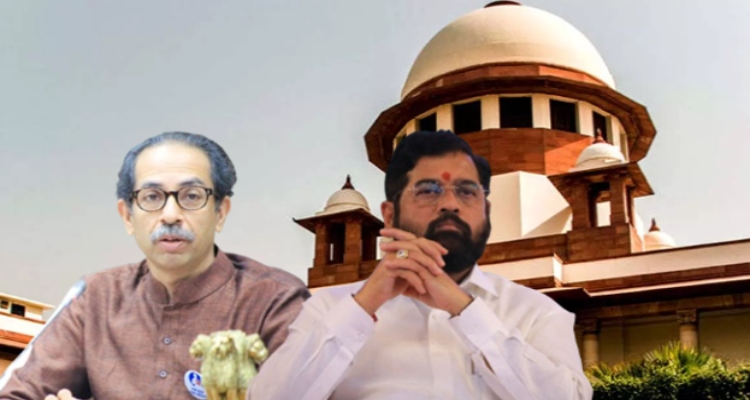
The Supreme Court on Wednesday agreed to consider listing a plea from the Uddhav Balasaheb Thackeray (UBT) faction. The plea challenges Maharashtra Legislative Assembly Speaker Rahul Narwekar’s order, which declared the Shiv Sena bloc led by Chief Minister Eknath Shinde as the “real political party” after their split in June 2022.
The Speaker had also dismissed the disqualification petitions of the Thackeray faction against CM Shinde and his supporting MLAs.
A bench comprising Chief Justice D.Y. Chandrachud and Justices J.B. Pardiwala and Manoj Misra was urged by senior advocate Abhishek Singhvi, representing UBT leader Sunil Prabhu, to list the plea for hearing as the term of the assembly is nearing its end. “I will see,” the CJI said, and asked the senior lawyer to circulate an email to this effect.
On January 22, the Supreme Court had issued notices to the Chief Minister and other lawmakers of his group regarding Prabhu’s plea. The Thackeray faction has alleged that Shinde “unconstitutionally usurped power” and is leading an “unconstitutional government.”
Maharashtra Speaker’s Rejection
In an order dated January 10, Speaker Narwekar also rejected the Thackeray faction’s plea to disqualify 16 MLAs of the ruling camp, including Shinde. Challenging the Speaker’s orders, the Thackeray faction claimed they are “patently unlawful and perverse,” asserting that instead of penalizing defection, the orders reward defectors by recognizing them as the real political party.
The plea argues that all the impugned decisions are based on the finding that the majority of legislators represent the will of the political party, thus exempting them from disqualification. In his ruling on the disqualification petitions, the Speaker did not disqualify any MLA from the rival camps.
The Speaker’s ruling further solidified Shinde’s position as Chief Minister, 18 months after he led a rebellion against Thackeray, enhancing his political standing within the ruling coalition, which also includes the BJP and the NCP (Ajit Pawar group). Narwekar stated that no party leadership can use provisions of the 10th Schedule of the Constitution (anti-defection law) to suppress dissent or indiscipline within a party.
The Shinde group had the support of 37 out of 54 Sena MLAs when the party split in June 2022, as noted by the Speaker.
Election Commission’s Decision
The Election Commission had awarded the ‘Shiv Sena’ name and ‘bow and arrow’ symbol to the Shinde-led faction in early 2023. Narwekar had also determined that Sunil Prabhu of the Sena (UBT) ceased to be the whip from June 21, 2022, when the party split, and legislator Bharat Gogawale of the Shinde group became the authorized whip. The Speaker held that the Shiv Sena ‘pramukh’ (chief) did not have the power to remove any leader from the party and did not accept the argument that the will of the party chief and the will of the party were synonymous.




